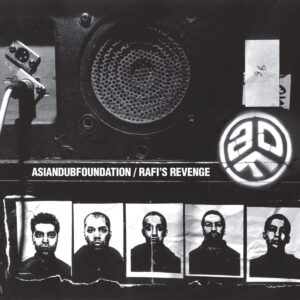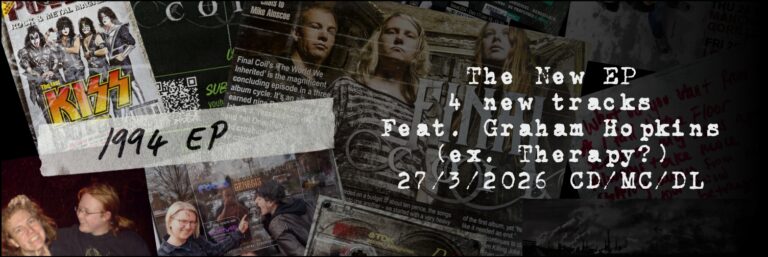Released in 1998, Rafi’s Revenge was a partial re-recording of the French-only release R.A.F.I. (which chalked up 10,000 in sales) from the previous year. A ferociously eclectic mix, the album was a huge success, garnering the band a Mercury Music Prize nomination as the UK caught up with that which the rest of Europe had known since the release of debut album fact and fictions.
A somewhat transitional time both musically and socially, Rafi’s Revenge emerged at a point where the initial exuberance of Britpop music was fading, soon to be replaced by a head-splitting hangover that saw Labour leader Tony Blaire cosying up to George W. Bush and, eventually, leading the country into an ill-gotten war. As such, albums like Massive Attack’s Mezzanine and ADF’s Rafi’s Revenge (released the same year) were remarkably prescient, but whilst Mezzanine seemed to lurk in the shadows, Rafi’s revenge was more directly confrontational with tracks like Hypocrite capturing the undercurrent of tension that began to emerge at the tail end of the 90s. Now reissued via London records with a bonus disc, Rafi’s revenge still sounds like nothing quite else out there. It’s telling that, far from open the floodgates, the intensely innovative music of the 90s was soon to be replaced with rather more generic sounds as people retreated to familiar ground and yet, for a while, it seemed that Asian Dub Foundation could conquer the world.
What is immediately apparent is that ADF’s free-spirit innovation remains unsurpassed. Even today, with twenty years separating us from the original release, the album retains its fire. Other bands may have drawn from the rampant genre clashes in which ADF delighted, but none with quite such open-mindedness, and ADF remain sonic innovators – very much a sum of their disparate individual parts.
The album opens with Naxalite, the atypical guitar work of Steve Savale giving way to a skittering breakbeat over which Dr Das’ dub bass roams at will. It’s a startlingly ambitious piece of music and Deeder’s youthful rapping gives the track a punk energy that feels utterly irrepressible. The skanking buzzin’, with its scratchy guitar work and haunting flute is no less densely plotted, the claustrophobic opening giving way to a unique take on jungle that explodes into a full-blown art-rock extravaganza towards its conclusion as Chandrasonic’s guitar plunges the track into a seething cauldron of post-punk noise. Such apocalyptic, guitar-led white-outs stand in almost complete opposition to almost any other dance-oriented act of the period with, only perhaps the exception of Massive Attack, and it still sets the senses reeling today. Black white is musically more relaxed with a mid-tempo dub vibe and a sing-along chorus, although Deeder once again leads from the front with a scene-stealing rap that leaves the listener breathless. It sets the scene nicely for the blistering assassin, a track that starts off innocently enough with descending chords and a crackly sample before suddenly exploding into life, gaining momentum until it reaches unstoppable speeds and collapses in upon itself. Steve demonstrates a hitherto hidden funky edge on the clanking dub of hypocrite / charge, the track occupying a similar territory to Dreadzone, albeit with a considerably more vibrant rapping style.
Such free-flowing psychedelia finds its ultimate expression in the dubbed-out noise of free Satpal Ram, all juggernaut beats and spaced out guitar. In a recent interview, Steve acknowledged his love of David Bowie, Sonic Youth and the like, and his hypnotic guitar lines snake beautifully around the song’s core, hypnotising the listener and leaving them unprepared for the punk-infused fury of the track’s finale. Boasting a brilliantly-realised opening lyric, Dub mentality is a literate and carefully-crafted riposte to those who think that dub is all about ‘herbal intake’, the track itself slowing the pace and allowing some subtle, folky influences to filter through the echoing beats. Stripped down at the outset to vocal and percussion, culture move is a collaboration with Navigator that recalls Leftfied’s Afro Beat. Taking things up a notch, the punk–ish operation eagle lie has lost nothing of its streetwise savagery, whilst change is churning drum ‘n’ bass blast with so many different influences both musically and culturally, that you never quite know where you are with it. The album concludes with tribute to John Stevens, a track full of creeping ambiance thanks to a relaxed beat underpinned by serpentine bass that rumbles from somewhere deep within the earth. A perfect end to the album, the Eastern elements combine with the rhythmic pulses to create something truly otherworldly, and which other acts have been trying to recreate ever since.
As an album, Rafi’s revenge remains untouchable but, for those who already own the album, the first disc is largely redundant. However, where this reissue comes into its own is a second disc entitled under the influence, which sees Adrian Sherwood gather together rare, unheard and mastered tracks. Unlike most bonus discs, real thought has gone into under the influence and the album flows from the intro onward in a way that raises it from the ranks of curio to a fully-fledged album in its own right, to which fans of ADF will return time and again. Highlights abound, but the gloriously chilled dub of Culture move (Audio Active Pusher Sound mix) and the insane Free Satpal Ram (Russell Simmins Remix) provide the twin peaks, whilst simultaneously emphasizing the band’s rich diversity. After four spins, under the influence continues to surprise and delight an it is an essential compendium piece to the original album.
A truly eclectic and free-thinking act, it is impossible to describe now just how influential ADF were, and yet, in the 90s, the band combined audiences from a wide range of genres in a way that few artists seem to be able to replicate. From dance to rock via jungle and jazz, ADF used the power of music to unite an audience from a huge range of backgrounds and their shows around that time were simply stunning. The band remain as active, intelligent and articulate today as they were when they began, but for those who grew up in the 90s, Rafi’s Revenge has earned a particularly special place in music collections. This reissue, expanded with a bonus disc that is well worth the price of admission alone, should be mandatory listening as an example of how to cross musical boundaries free from any previously-conceived constraints and it has lost none of its lustre in the decades that have passed since its release. 10




